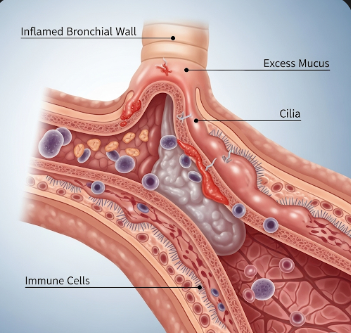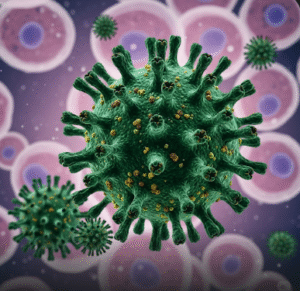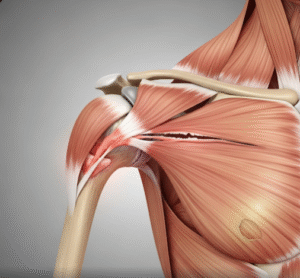Overview
Bronchitis is an inflammation of the bronchi, the large airways of the lungs, leading to coughing, mucus production, and breathing difficulties. It can be classified as acute or chronic. Acute bronchitis is usually caused by viral infections and resolves within a few weeks, whereas chronic bronchitis is a long-term condition often associated with smoking, environmental pollutants, or underlying lung disease.
In Korea, bronchitis is treated in pulmonology and respiratory clinics, where patients receive accurate diagnosis, treatment for underlying causes, and preventive care. Korean healthcare emphasizes early intervention, symptom management, and patient education to minimize complications and improve lung health.
What is Bronchitis?
Bronchitis occurs when the lining of the bronchi becomes inflamed, causing swelling and increased mucus production. The narrowed airways lead to persistent coughing, wheezing, and difficulty breathing.
Types of bronchitis include:
- Acute bronchitis: Short-term inflammation usually caused by viral infections such as influenza or RSV. Symptoms typically resolve within 2–3 weeks.
- Chronic bronchitis: Defined by a cough with sputum production lasting at least three months in two consecutive years, often related to smoking, air pollution, or chronic irritants.
- Asthmatic bronchitis: Occurs in patients with asthma, where bronchial inflammation exacerbates airway constriction.
Symptoms
Symptoms of bronchitis vary depending on the type:
- Persistent cough, often producing mucus (clear, yellow, or green)
- Shortness of breath or wheezing
- Fatigue or mild fever
- Chest discomfort or tightness
- Sore throat and runny nose in acute cases
- Recurrent episodes in chronic bronchitis
- Exacerbation of underlying lung conditions
Acute bronchitis symptoms usually appear suddenly, whereas chronic bronchitis develops gradually over months or years.
Causes
Bronchitis can be caused by infections, irritants, or chronic conditions:
- Viral infections: Influenza, RSV, adenovirus, rhinovirus
- Bacterial infections: Less common, but include Bordetella pertussis and Mycoplasma pneumoniae
- Smoking: Major risk factor for chronic bronchitis
- Air pollution: Long-term exposure to dust, fumes, and chemicals
- Occupational hazards: Exposure to irritants such as asbestos or chemical fumes
- Gastroesophageal reflux disease (GERD): Can trigger chronic irritation in the airways
Risk Factors
- Smoking or secondhand smoke exposure
- Chronic lung disease such as COPD or asthma
- Exposure to environmental pollutants
- Weak immune system due to age, illness, or medication
- Frequent respiratory infections
- Genetic susceptibility in some individuals
Complications
If left untreated, bronchitis can lead to:
- Pneumonia due to bacterial superinfection
- Chronic obstructive pulmonary disease (COPD) in long-term smokers
- Respiratory failure in severe cases
- Frequent exacerbations leading to hospitalization
- Reduced quality of life due to persistent cough and fatigue
- Asthma flare-ups or worsening of existing lung conditions
Prevention
Preventive strategies focus on reducing exposure to irritants and infections:
- Avoid smoking and secondhand smoke
- Wear masks in polluted or dusty environments
- Vaccinations against influenza and pneumococcal infections
- Hand hygiene to reduce viral infections
- Maintaining indoor air quality with air purifiers and ventilation
- Regular exercise and balanced diet to support lung health
- Prompt treatment of upper respiratory infections
Treatment Options in Korea
Diagnosis
Accurate diagnosis is essential to distinguish bronchitis from pneumonia or other respiratory conditions:
- Medical history and symptom review
- Physical examination including lung auscultation
- Chest X-ray if pneumonia is suspected
- Sputum culture in bacterial cases
- Pulmonary function tests for chronic bronchitis or underlying COPD
Medical Management
Treatment depends on the type and severity:
Acute bronchitis:
- Rest and hydration to support recovery
- Cough suppressants for severe cough
- Antivirals if caused by influenza
- Antibiotics only for confirmed bacterial infections
Chronic bronchitis:
- Bronchodilators to open airways
- Inhaled corticosteroids to reduce inflammation
- Oxygen therapy in severe cases with low oxygen levels
- Pulmonary rehabilitation to improve lung function and quality of life
- Smoking cessation programs for long-term management
Supportive Care
- Humidified air to ease breathing
- Breathing exercises to improve lung capacity
- Nutritional support to maintain energy and immune function
- Education on avoiding triggers and proper inhaler use
Prognosis
The prognosis varies by type:
- Acute bronchitis generally resolves within 2–3 weeks with supportive care
- Chronic bronchitis requires long-term management, but symptoms can be controlled with medication, lifestyle changes, and avoidance of irritants
- Early intervention and patient education in Korea improve outcomes and reduce the risk of complications
- Access to advanced pulmonology care and rehabilitation ensures better symptom control and quality of life
With specialized care, modern diagnostic tools, and comprehensive patient education, Korea offers effective management for bronchitis, helping patients recover from acute episodes and control chronic conditions to maintain lung health.













